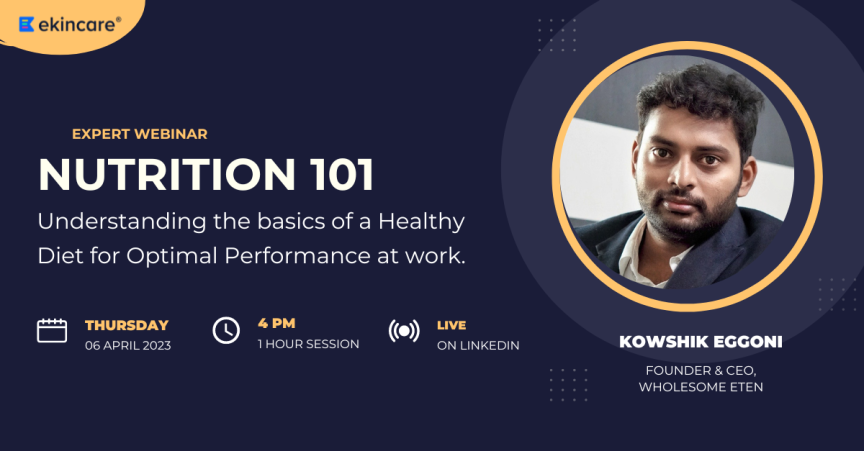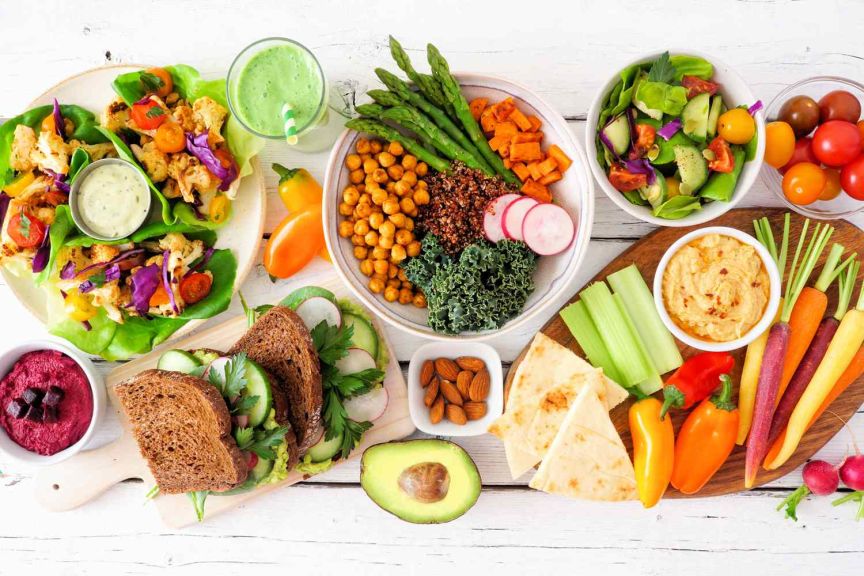Learn why leading HR professionals trust ekincare! Explore Now

In today's fast-paced world, it's easy to neglect our health and well-being, especially when it comes to nutrition. However, what we eat has a direct impact on our performance and productivity at work. In this webinar Mr. Kowshik Eggoni, Founder & CEO of Wholesome Eten, would be presenting his views on how essential it is to understand the basics of a healthy diet and how it can help us achieve optimal performance in the workplace.
In this webinar, he would be sharing the fundamentals of nutrition, including macro and micronutrients, the importance of hydration, and healthy habits that can be incorporated into our daily lives. We hope that by the end of this session, you will have a better understanding of how nutrition can impact your performance and how you can make simple changes to your diet and lifestyle to optimize your productivity at work.
If you are planning to have a healthy diet, you need to set your goal and start with protein, which is the key macronutrient in the goal setting process. Depending on your dietary habits, you need to decide on the ratio of fats and carbs. National Academy of Medicine recommends a ratio of 45 to 65% carbohydrates, 10 to 25% protein, and 20 to 35% fat, mostly from Whole Foods. Including Whole Foods in your diet is essential as they are dense in nutrition and have a lot of fiber. This helps with essential functions like strong immunity, sustained energy, and good hydration throughout the day. There are no shortcuts, and you need to maintain this balance to stay healthy.

From what I understand, getting the right balance of macronutrients in my diet is crucial for my overall performance, both at work and in my personal life. Carbohydrates are the main source of energy for my body, and I can relate to feeling low on energy when I don't have enough of them in my meals. On the other hand, fats are essential for proper brain function. Therefore, it's important that I include both of these macronutrients in my diet in the right proportions.
For example, if I have a lot of work to do in the morning, I need to have a well-balanced breakfast that includes good sources of protein, carbs, and fats. This will help me stay energized and focused throughout the day. As the day goes on and my energy requirements change, I can sustain myself on carb-rich foods like fruits and vegetables. It's important to avoid processed foods and stick to whole foods, like brown rice instead of white rice, to ensure that my energy levels are sustained and I have enough fiber in my diet. By doing so, I can maintain a consistent level of energy and perform at my best throughout the day.
let me break it down for you. Let's talk about mindful eating. Mindful eating is a simple way to maintain mindfulness in anything you do. When you're mindful, you're just being conscious of what you're doing. The biggest challenge in corporate life is that we tend to snack or have lunch at our desks without paying attention to our food. One hack to improve this is to have a common kitchen or cafeteria area where you can eat lunch, just lunch, nothing else. This refreshes your brain and gives you a new perspective before going back to work. The biggest benefit of this is that you're paying attention to your food and sending signals to your brain when you're full or not. This can help you avoid overeating or undereating.
Now, let's talk about sticking to a certain diet. Leaving a diet halfway is usually due to habit and routine. Habits make things effortless, and you need to cultivate good eating habits to stick to a diet. For example, if cooking breakfast is becoming difficult, you could use a slow cooker to cook meals overnight. This way, you've created one tiny habit that makes your entire breakfast routine easier. You could also make a habit of looking up your nutrition recommendations the night before to hold yourself accountable. By doing this consistently, you'll get into a routine, and it will become effortless.
I was having this problem for a number of years. So the biggest solution to this is to eat a lot before the evening. But how do you eat a lot? That's the final question. So smart snacking is the term that's going around in this case. Smart snacking is nothing but snacking in a way that's healthy and nutrient-dense. There are two ways to look at it. First, the snacks should be accident-friendly, and second, the snacks should be nutrient-dense because every time we snack, we are loading our bodies with energy, and that energy should have micronutrients so that the metabolism is working at the same pace.
For diet, the low-hanging options are fruits and veggies. Cutting them is the easiest way. But those are the most boring ones as well for many people. So the second-best option is to get creative and make your snacks. You can try things like granola to make it interesting. You can pour the granola with chocolate. That way, you're not eating a lot of chocolate, but you're getting the same flavor and goodness. Popcorn is a great one too. It's super easy to make in the microwave. There are many such alternatives.
But there's another problem here. You can run out of ideas. However, there are many nutrition apps these days that can give you just the idea that you would need. And when you see the platter of options, it really becomes easy to pick one. But you just need to do these things proactively. You need to pre-plan. And mindfulness plays a key role here. You sort of know that by the end of the day, say around 4 p.m., your energy is going to go lower. So it's time to replenish and stuff. So, yeah. You can do many things, but pre-planning is a huge habit that can help you.
The best way to maintain a healthy diet is to consult a nutritionist, but if you want an easy way, you can incorporate a variety of foods into your meals. Sometimes people make the mistake of eating just one type of food, but this can cause problems. For example, some people who try to bulk up just eat a lot of eggs and chicken, while those who want to slim down skip carbs like rice, which can lead to nutritional deficiencies.
To ensure that you get all the nutrients your body needs, switch up your options and recipes. Incorporate a variety of foods like quinoa, millets, couscous, chapati, bananas, and more. Choose nutrient-dense and calorie-dense snacks wisely, and when you're not active, opt for low-calorie and high-nutrition foods like fruits and vegetables. Stay hydrated by drinking plenty of water, sparkling water, and eating fruits like cucumbers and watermelon.
If you're deficient in any micronutrient, consult a professional and consider supplementation. To maintain healthy habits at work, pre-plan and pack nutritious lunches and snacks, and make use of batch cooking. You can also encourage your workplace to offer healthy options.
Eat mindfully, take a break, and make it a group effort. Have potlucks and participate in wellness challenges like hydration challenges. Technology can help you plan and outsource the burden to an expert. Set realistic goals and seek support from like-minded people or your family members. Encourage each other and hold each other accountable to stay consistent.
So, if you want to maintain a healthy diet and lifestyle, make sure to incorporate a variety of foods, stay hydrated, and seek professional advice if necessary. Remember to set realistic goals, seek support from a community, and stay consistent.
Learn how your organisation can get the best employee health and well-being experience with ekincare`s commitment to quality.